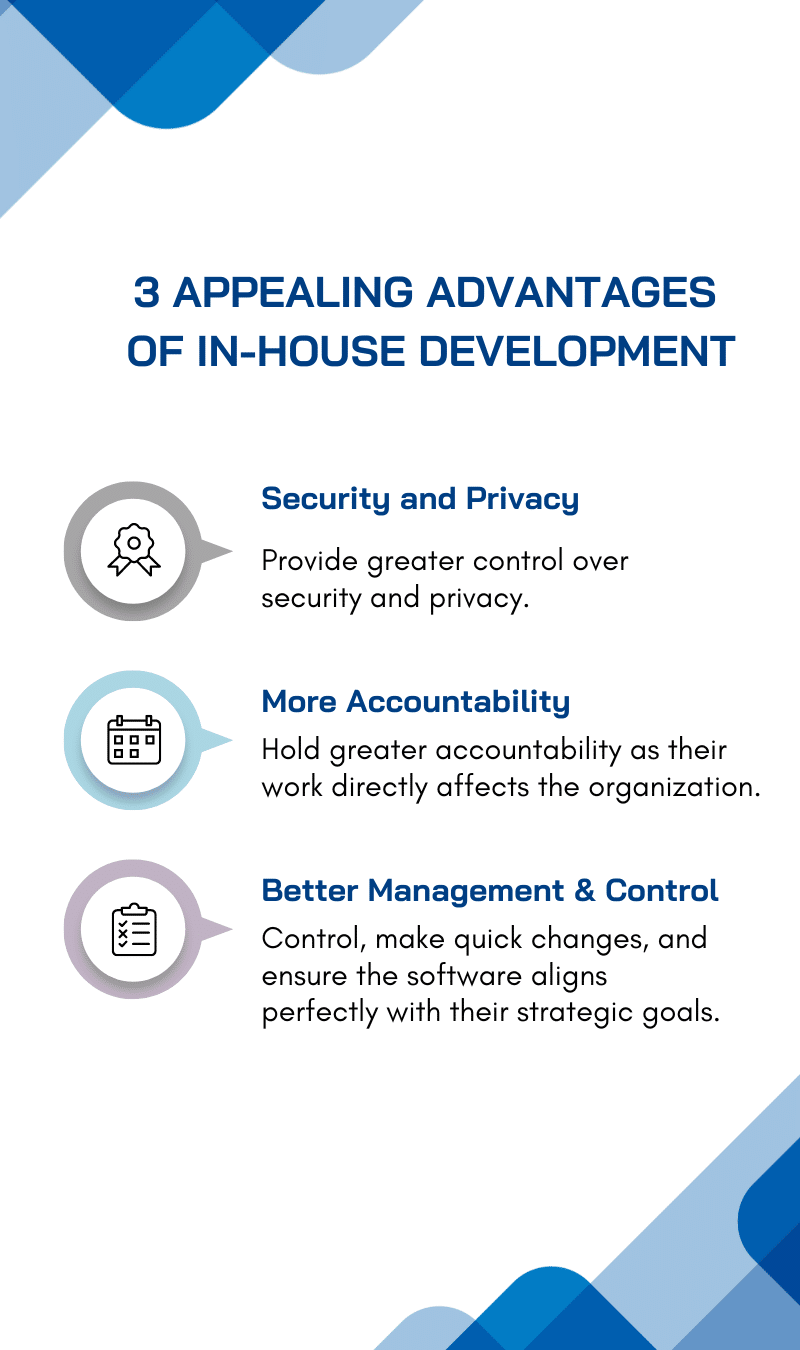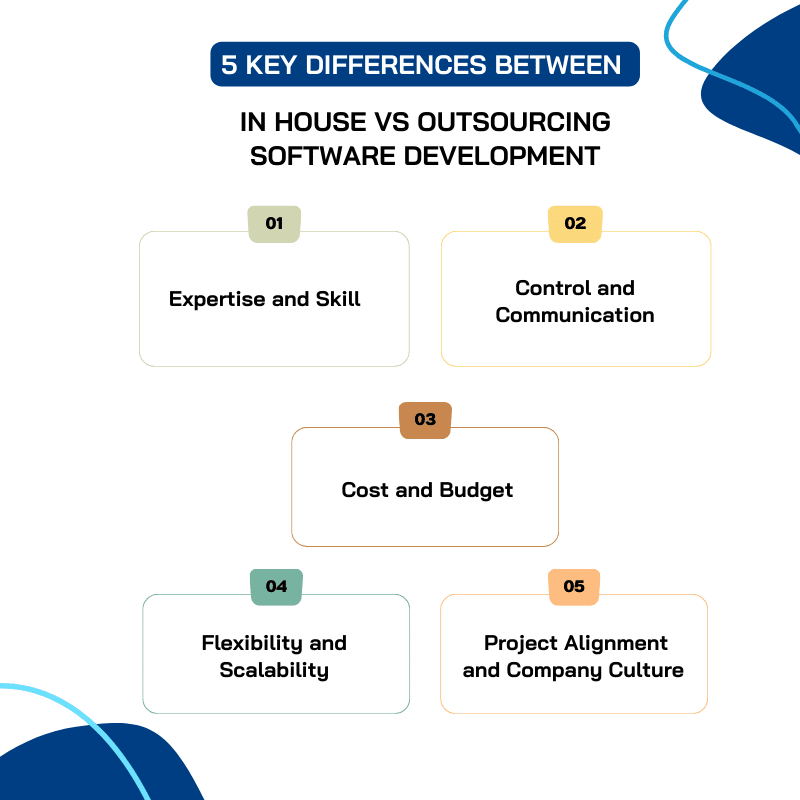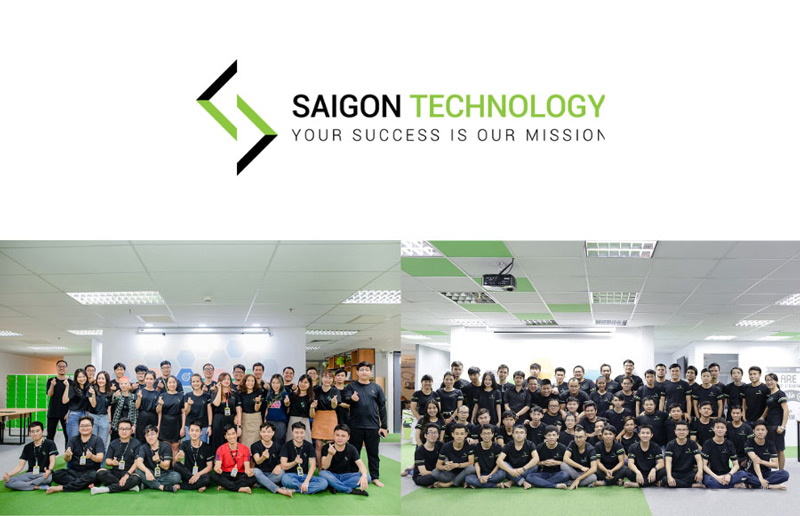In-House vs Outsourcing Software Development: 5 Key Insights for Better Decisions

When it comes to building software for your business, deciding between in-house vs outsourcing software development is crucial for innovation and growth. Newwave Solutions will explore the pros and cons of in-house software development versus outsourcing software development, helping you make an informed decision that aligns with your business goals!
1. In-house vs outsourcing software development: an overview
Choosing between in-house vs outsourcing software development is a critical decision for businesses looking to innovate and grow. This guide will explore both approaches comprehensively, providing insights into their definitions, advantages, disadvantages, and the top countries for outsourced software development.

1.1. What is In-house Development?
In-house development means creating software within your organization using your resources and employees. You hire and manage a team of developers responsible for the entire software development process, from planning to deployment. This approach ensures that the software is developed specifically for your company’s needs and remains fully under your control.
Many companies establish an internal dev house or house development team to manage ongoing software projects. This dedicated team handles all aspects of software development, ensuring alignment with the company’s goals and providing the flexibility to make changes as needed.
In-house developed solutions can be critical for businesses looking for tight control over the software’s direction and integration with existing systems. In-house software development allows for close collaboration and faster iteration. Notable in-house development examples include companies like Google and Amazon, which develop and maintain their core products entirely in-house. These organizations prioritize control over their development processes to align their software with their long-term strategic objectives.
1.2. What Is Outsourcing in Software Development?
When considering outsourcing software development, it’s important to first distinguish between software product development and outsourced projects. Software product development focuses on creating software that serves a business’s core functions, typically built and managed in-house to maintain control and alignment with the company’s long-term goals. On the other hand, outsourced projects are often specific tasks or features that complement the main product but are developed externally.
By partnering with a software development house, businesses can access global talent and cutting-edge technologies, often at a lower cost than hiring full-time developers for in-house development. However, as with any business decision, it’s crucial to carefully weigh the outsourcing IT pros and cons before making a final decision. The pros and cons of in-house software development are also vital to consider when deciding between in-house vs outsourcing software development.
2. Pros and cons of in-house software development
When comparing in-house vs outsourcing software development, it’s essential to understand the unique benefits and challenges that come with developing in-house. In-house development involves creating software within your organization using an internal team, which can offer distinct advantages for businesses. However, some trade-offs need to be considered.
In-house software development has several appealing advantages for businesses looking to maintain direct control over their software projects:
- Greater Control and Oversight: With in-house software development, you have complete control over the entire process. Your team can make real-time adjustments and ensure the project aligns with business priorities. This level of control is difficult to achieve when compared to outsourced projects.
- Enhanced Security and Privacy: Developing software in-house provides superior security for sensitive data and proprietary information. By keeping the project within your company, you reduce the risks associated with sharing data with third parties, as seen in outsourcing IT pros and cons.
- Better Management and Accountability: In-house teams integrate well with your company’s culture, ensuring that software projects are aligned with strategic goals. The in-house development approach leads to better communication and more efficient project management. Additionally, house development teams can respond to changes quickly and effectively.

Developing in-house allows you to closely monitor and better understand your business needs. However, in-house developed solutions come with some challenges:
- Limited Specialized Expertise: While in-house development teams are highly skilled, they may lack the specialized knowledge needed for advanced projects. For example, if your software requires niche technologies like blockchain or AI, in-house development examples may not always meet your needs without external hiring or additional training.
- Higher Costs: Developing in-house software requires substantial investment, including salaries, benefits, and infrastructure. This makes it a more costly option compared to outsourcing software development, which is one of the pros and cons of in-house software development.
- Potential for Internal Conflicts: Managing an in-house software team can lead to internal conflicts or miscommunication, especially when team members have differing skill sets or communication styles. This is less common when compared to the dynamics of outsourcing software development pros and cons, where external teams bring their structure.
- Resource Constraints: An in-house development team is limited to the resources your company can provide. Large or complex projects may stretch your team’s capacity, potentially leading to delays or subpar results. For example, a software development house that specializes in specific technologies may handle niche software development better than an internal team. However, in-house developments tend to have a better understanding of your business culture and objectives.
Ultimately, if your project is critical to your core business or long-term plans, developing in-house ensures that your team is fully aligned with the company’s mission. But if specialized expertise is required or if scalability is a concern, you might want to distinguish between software product development and outsourced projects as a more suitable option.
3. Outsourcing software development pros and cons
Outsourcing software development offers a different set of advantages and challenges compared to in-house development. Understanding these pros and cons of in-house software development can help you determine if this approach aligns better with your business objectives and project needs.
3.1. Advantages of outsourcing software development
Cost Savings
Outsourcing software development pros and cons reveal that outsourcing can be an effective way to save costs. By collaborating with an external software development house, businesses can avoid the overheads associated with hiring and maintaining an in-house team. For example, when WhatsApp outsourced the development of its iPhone app to a freelancer, it was cheaper compared to hiring local specialists. The result? Eventually, WhatsApp’s app became super popular, with more than 1.5 billion active users.
Access to Specialized Talent
When you distinguish between software product development and outsourced projects, one major benefit of outsourcing is access to specialized talent. By collaborating with a dev house or outsourcing firms, businesses can tap into a global talent pool, enabling them to find highly specialized developers regardless of their location. IKEA, for instance, outsourced technology experts to innovate in the smart home space, leveraging global expertise beyond what could be found in-house.
Scalability and Flexibility
Scalability is another key advantage of outsourcing. For growing companies, outsourcing allows for rapid scaling, either up or down, depending on project demands. BaseCamp, for instance, outsourced its app development when the company experienced rapid growth, ensuring that the development team could handle the increased workload without sacrificing quality. This is a clear example of how outsourcing software development helps businesses remain flexible and adaptable.
Focus on Core Activities
On the other hand, in-house development allows businesses to maintain control over their projects and keep software development closely aligned with company culture and strategic goals. When developing in-house, your team is integrated into the business processes, ensuring better cohesion and alignment with your in-house software needs. This is especially beneficial for projects central to your business model.
Risk Mitigation
Outsourcing also helps reduce risks, especially in terms of managing software development. By collaborating with established teams that have solid project management practices, businesses can mitigate risks associated with the development process. Slack, for instance, outsourced beta testing to reduce risks in its development cycle.
These real examples show that outsourcing software development can bring tangible benefits, ranging from cost savings to accessing world-class talent, all while allowing flexibility and scalability.
3.2. Challenges of outsourcing software development
While outsourcing software development offers many advantages, there are also several challenges that companies should carefully consider before deciding whether to develop in-house or work with an outsourcing dev house.
Privacy and Security Concerns
One of the primary concerns when outsourcing is privacy and security. Sharing sensitive data and proprietary information with external vendors can expose your business to potential risks. It’s crucial to ensure that your outsourcing partner adheres to strict security protocols to safeguard this data. Conducting thorough due diligence and setting clear confidentiality agreements can help mitigate these risks.
Communication Challenges
Outsourcing can create communication challenges, especially when working with teams across different time zones. Delays and coordination difficulties may arise, making it harder to stay aligned on project goals and timelines. Additionally, differences in work culture and expectations can further complicate communication. To address this, clear communication channels, regular check-ins, and a well-defined project management process are essential.
Quality Concerns
Maintaining consistent quality control can be challenging when you’re not directly overseeing the development process. Variability in standards and practices between your in-house team and the outsourcing provider can lead to inconsistent results. To ensure high-quality outcomes, it’s vital to set clear quality expectations from the start and regularly review progress to ensure alignment with your objectives.
Cultural and Strategic Misalignment
Cultural and strategic misalignment can occur when outsourced teams don’t fully understand your company’s culture or strategic goals. This can result in a lack of cohesion and affect the project’s success. Building a strong relationship with your outsourcing partner and ensuring they are well-versed in your company’s values and objectives is key to overcoming this challenge.
In the context of in-house vs outsourcing software development, outsourcing can be an attractive option for companies looking to reduce costs or tap into external expertise. For businesses seeking to scale quickly, an IT outsourced development team can provide a cost-effective and efficient solution. However, careful consideration of privacy, communication, and quality control is essential to ensure success.
4. The 5 key differences between in-house and outsourcing software development
The big difference between in-house vs outsourcing software development is that in-house development means you’re handling tasks and projects with your team and resources within your organization. On the other hand, outsourcing means you’re passing those tasks off to outside experts or companies.
The following comparative table outlines key aspects that will help you distinguish between in-house and outsourcing software development, ensuring you choose the best approach for your project:
Comparative overview of in-house vs outsourcing software development table
|
Aspect |
In-House Development |
Outsourcing Software Development |
|
Expertise and Skill |
Utilizes your internal team’s skills, which may be generalist or specialized depending on the team. Often lacks niche expertise. |
Provides access to a global pool of specialists with specific skills and expertise tailored to your project needs. |
|
Control and Communication |
Allows for direct and immediate communication with the development team. Provides better control over the project and easier integration with company culture. |
May face challenges with communication, especially with teams in different time zones. Control over the project is more distant, potentially leading to coordination issues. |
|
Cost and Budget |
Involves fixed costs such as salaries, benefits, and infrastructure. Generally higher upfront costs but can be more cost-effective for long-term projects. |
Can be more cost-effective for short-term projects or when specialized skills are required. Typically, you pay for the work done, avoiding long-term employment costs. |
|
Flexibility and Scalability |
Scaling up or down can be slow and costly due to recruitment and training processes. Less flexible in adapting to changing project needs. |
Offers high flexibility and scalability. You can quickly adjust the size of your team according to project demands without long-term commitments. |
|
Project Alignment and Company Culture |
Teams are integrated into your company’s culture and aligned with your strategic goals, resulting in more cohesive and aligned project outcomes. |
External teams may not fully understand or align with your company culture and strategic goals, which can lead to potential misalignment in project outcomes. |
This comparison helps you weigh the benefits and drawbacks of each approach, allowing you to make an informed decision based on your project requirements and organizational goals.

5. Picking the right software development approach
So, you are trying to decide between in-house vs outsourcing software development? Let’s break down the basics.
5.1 Assess Your Project’s Needs
If your project requires specialized skills or advanced technology that your current team doesn’t possess, outsourcing is a smart solution. Specialized software development houses can provide the expertise and resources needed for these complex tasks.
Conversely, if the project is straightforward and fits well with your team’s current capabilities, in-house development may be more efficient and cost-effective.
5.2 Evaluate Your Budget
When it comes to budget, outsourcing often offers cost savings, especially for short-term or specialized projects. This allows you to avoid the long-term expenses of hiring and maintaining an in-house team.
However, if you have the resources for an upfront investment and need ongoing development, in-house development might offer better long-term value. Be sure to consider hidden costs in outsourcing, such as communication challenges and quality control issues.
5.3 Consider Control and Management
In-house development provides more control and direct oversight of the development process, which is beneficial if you need to manage the project closely and integrate it with your company’s culture.
On the other hand, outsourcing requires effective vendor management, where clear communication and regular updates are critical to ensure the external team aligns with your project goals and maintains quality standards.

5.4 Reflect on Flexibility and Scalability
Outsourcing is highly flexible, allowing you to quickly scale resources up or down based on project demands. This is especially useful for projects with variable requirements or short-term needs.
While in-house development offers stability, it may not be as agile in scaling. Recruiting and training new team members can be time-consuming and expensive, potentially impacting project timelines.
5.5 Align with Your Strategic Goals
If your project is critical to your core business and long-term goals, in-house development ensures better alignment with your company’s mission. However, if the project requires specialized skills or is less central, outsourcing allows your internal team to focus on core activities while meeting your objectives. For projects like SaaS, outsourcing can be a solid choice to access expertise and extra capacity.
If you’re considering outsourcing as your preferred approach, a Comprehensive Guide To Software Development Outsourcing Services can help you make an informed decision.
6. Top 5 IT Outsourcing Companies to Consider for Your Software Development Needs
If you’re considering outsourcing as your preferred approach, a Comprehensive Guide To Software Development Outsourcing Services can help you make an informed decision. Here are five IT outsourcing companies to consider:
6.1. Newwave Solutions
Having served over 12 years with more than 300 professionals in a team, Newwave Solutions is a top 10 software development company in Vietnam. From mobile app development to AI, blockchain, and UI/UX, their areas of expertise vary greatly. Its major awards and recognitions include the Sao Khue 2022 Award, the Top 10 Information and Communication Technology 2022 Award, and High Growth Companies by Statista & The Financial Times.

6.2. MOR Software
MOR Software specializes in tailored software development, mobile applications, AI solutions, and blockchain integration. With a focus on the Japanese, Korean, Singaporean, and Vietnamese markets, they have served top clients like TECHCOMBANK, Viettel, and Golden Gate. Their assurance of timely delivery along with technical expertise has earned them their reputation as a reliable partner.

6.3. KMS Technology
KMS Technology is an international leader in software development, consulting, and QA services. Incorporated in 2009, KMS’ incubated test automation platform, Katalon, raised $27 million in 2021. With offices in both Vietnam and Mexico, KMS has earned HITRUST certification, hence ensuring a high standard of protection and security regarding data handling. Their ability to deliver quality solutions across industries makes them an excellent partner for complex IT projects.

6.4. Saigon Technology
Saigon Technology provides tailored services for custom software development, web applications, and IT consulting. Among the top 15 software outsourcing companies in Vietnam, they can guarantee scalable and responsive solutions, shaped by the needs of each client. Their market is basically in Vietnam, but they are a very strong player due to their agile approach.

6.5. FPT Software
FPT Software is an IT service company with over 20 years of experience and partnerships with numerous Fortune Global 500 companies. They provide digital transformation, software development, and IT consulting across industries like finance and healthcare. FPT is CMMI Level 5 and ISO 27001 certified, underlining its commitment to quality and security. While there have been some communication challenges, their industry expertise and global reach make them a reliable choice for large-scale projects.

7. Wrapping up
Deciding between in-house vs outsourcing software development is a critical choice that depends on your specific project requirements, budget, and business goals. By understanding the pros and cons of each approach, you can make an informed decision that aligns with your company’s needs.
For personalized guidance on choosing between in-house vs outsourcing software development, contact Newwave Solutions. We help businesses navigate these decisions to achieve optimal results.
Contact Information:
- Head Office (Hanoi): 1F, 4F, 10F, Mitec Building, Duong Dinh Nghe Street, Yen Hoa Ward, Cau Giay District, Hanoi City, Vietnam
- Branch Office (Tokyo): 1chōme118 Yushima, Bunkyo City, Tokyo 1130034, Japan
- Hotline: +84 985310203
- Website: https://newwavesolution.com
- Email: [email protected] developed
To Quang Duy is the CEO of Newwave Solutions, a leading Vietnamese software company. He is recognized as a standout technology consultant. Connect with him on LinkedIn and Twitter.

Read More Guides
Get stories in your inbox twice a month.
Let’s Connect
Let us know what you need, and out professionals will collaborate with you to find a solution that enables growth.




Leave a Reply